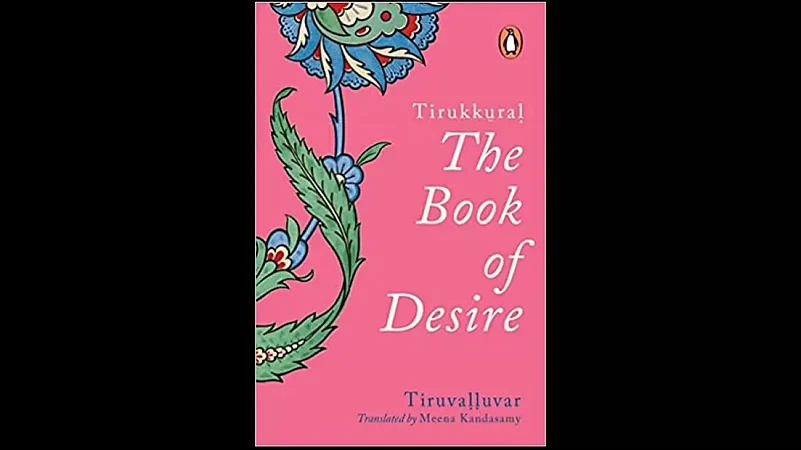THE PLEASURE PRINCIPLE
The Book of Desire
Tiruvelluvar
Translated by Meena Kandasamy
Penguin
INR 499/
The Book of Desire is the third of three parts of the Tirrukural written by Valluvar in what is now called high Tamil distichs. The book has 25 sections each containing 10 kurals or couplets that deal with the flowering and growth of love and, through love, desire. According to those who in the Vedic age sought morals in everything, pleasure is part of the values of human life that were referred to as the Purusarthas, ‘inbam’ in Tamil equates to ‘kama’ in Sanskrit though unlike the KamaSutra, The Book of Desire does not include the practical mechanics of lovemaking but about love and passion between two lovers who become husband and wife and are therefore acceptable in the eyes of society, despite any gossip they may engender.
The book has been debated by Indologists over time and Kamil Zvelebil, the Czech expert on Tamil literature is of the opinion that this is the most fluid of Valluvar’s books, the others dealt with various teachings and social mores since the mentor steps aside to lose himself in the pleasures of love. Valluvar’s divisions are true to the dictates of Tamil love poetry covering encounter, yearning, sulking – which seems to have been common to all Indian love poetry, and more. Five of these chapters actually related to the Tamil landscapes in which the lovers’ emotions were linked to nature and location.
Meena Kandasamy’s translation of The Book of Desire has a stated objective – to free it from the shackles of colonialism, Brahminism and the other political isms imposed on the influential Tamil text of the Tirukkuṟal, across time. There are two facets to this – Kandaswamy’s facet of feminist expression, a love poem written by a male poet and translated by a feminist throws a gauntlet in the face of conservatism; and the facet of modernization, breaking away from convention and political correctness, if it is true to the text. She is very clear that she brandishes a political battle axe that destroys Brahminical notions that Tamil is not worthy of being written in or used in temples as well as the misogyny that has accompanied translations down the centuries.
The lady of the ‘dangerous beauty’ needs rescuing from convention and is given her own power with a shock troop of goddesses. She remains the bangled beauty with flowers in her hair but her longings are rephrased and find articulation to match those of her lover.

the battleaxe of passion
breaks down the door
of my unwavering mind
bolted with my coyness
Is Kandaswamy’s version of Kural 1251
Or take Kural 1091 which has been rendered classically as
A double witchery has glances of her liquid eyes;
One glance is glance that brings me pain; the other heals again
While Kandaswamy writes
her eyes hold two glances
one, the glance that causes
this disease, and two
the medicine that cures
Medieval commentators like the grandly named Parimelalhagar for example, ‘the handsome man on a horse’ sought to find a kind of virtue in the trembling of married desire. There actually is - from a cultural viewpoint it is obvious that the husband is a one-man woman, even though his wife throws fits of jealousy at him – this seems to reflect Velluvar’s own moral concerns about relationships. The ‘lord’ is also someone who seems to go chasing after money like many modern husbands.
Desire is a weakness, an overwhelming wish to succumb which cannot easily be translated as ‘sex’ since it goes beyond that, though Kandaswamy does use ‘sex’ for the sensuality and craving that lovers express. Desire has always been expressed as a kind of malady, a wilting towards total surrender; keeping the bangles, the bestie pendant and other accessories, Kandaswamy attaches new dynamism to the lovers. Certainly, those in love will want to revisit their emotions through this new rendering of The Book of Desire.


























